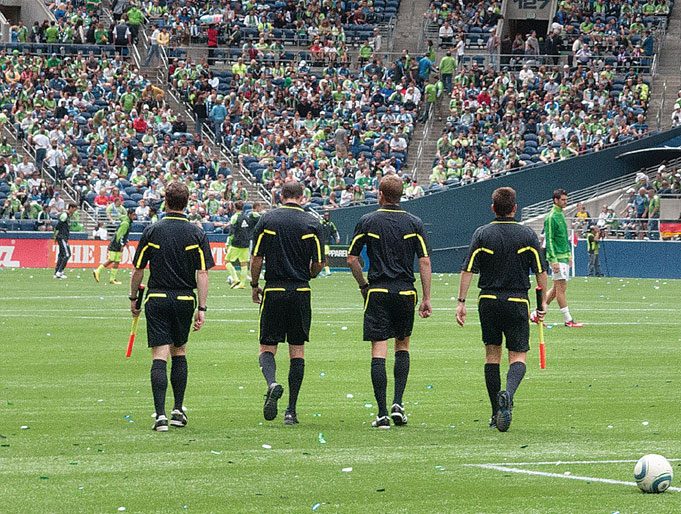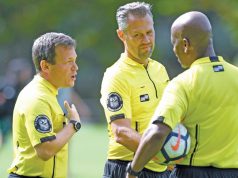A young, motivated and talented official was assigned as the referee in a college D-I highly contested conference game. The two assistant referees were seasoned veterans who have officiated high-level soccer for several years. It was a night game and there were more than 500 fans attending. The young referee was extremely excited for the opportunity determined to officiate their best game. The assistant referees were looking forward to doing whatever they could to help the referee be very successful. The pregame was very complete and it was a good dialogue between the entire crew. The assistant referees asked questions to ensure the referee covered every situation — all were ready to go out on the field.
During the national anthem, the referee investigated the stands and observed the crowd. The referee’s adrenalin began to flow, and she knew she was ready to officiate the game. It was a hard-fought contest and the referee worked very diligently to maintain control. The cautions that were administered were timely and assisted with game management. The referee ran well throughout the game and, almost without exception, was in the proper position. Both assistants were always in position and made several critical offside decisions as well as assisting with fouls they observed.
After the game, the referee was exuberant in the locker room. She thanked the assistants for their hard work. The referee team did a postgame review and unanimously determined that it was officiated almost flawlessly. The referee went home and stayed awake for several hours replaying the game and excitement that had just occurred.
The following weekend the same officiating crew was assigned to work together again. Only this time it was a low-level D-III amateur game between two teams that did not have a lot of skill. The crew arrived at the site and observed the home team put up the nets and finish marking the field. The field was in poor condition and there were several mud spots since it had rained hard earlier in the week. There were approximately 20 fans there to observe the contest. The pregame discussion was limited to which side the assistant referee would work on and a very short discussion about potential retaliations when players were fouled. The crew walked out to start the game and their enthusiasm about officiating the game was minimal at best.
Early in the game there was a hard foul and the referee awarded a direct free kick. The referee was not very close to the play since she was not running as much as usual. There was no attempt to speak to the player who committed the foul or to administer a caution. From that point on, the game became more physical, and hard to control. Similar potential problems were developing because the assistant referees were not working at the 100-percent level. Their mechanics were not very sharp and, as a result, the offside decisions were being questioned and dissent was becoming the norm. A defender committed a hard foul and the attacker was hurt. The referee walked to the situation and looked at the defender with disgust. At that point, a teammate of the attacker took matters into his own hands and headbutted the defender that committed the foul. The referee stood there in amazement and realized that an ejection had to be administered. The referee also realized that if she had dealt with the player who committed the foul, the retaliation might not have happened.
For the remainder of the game, the referee tried to work harder and focus more on the game. It was, however, too late. The players did not respect the officiating crew and began fouling more, arguing more and retaliating. The players felt they needed to take control since the crew had not. The game ended, and the officials had to leave the field quickly since several players were vocalizing that they were going to assault the officials.
The previous situation provides a teaching moment. Whenever two teams enter the field, no matter what their skill level, the game they are playing is the most important one of the day. They play as hard as they can and do whatever they can to secure a victory. Every game an official is assigned should be the most important game of the day.
An official should never approach a game with an attitude that he or she has received a poor assignment and should be somewhere else working a higher-level contest. A lackluster performance is never acceptable. Only performing at a high level when the game is the premier game of the day does not bode well for the officiating crew.
The officiating crew must remember they are professionals and work each and every game with 100-percent effort. This approach will result in several positive outcomes. The game should be better controlled and there should be fewer opportunities for retaliation fouls. The players will normally respect the officiating team and their decisions when they observe the team doing its best and exerting themselves throughout the game. Feedback about the game to the assigner, league officials, etc., will be positive and the crew will be recognized with future assignments.
There are no easy assignments. In every game there is potential for hard fouls, retaliation and misconducts. The crew must prepare for the game as if it is the best game in the area. Pregame conferences should always be thorough and prepare the officiating team for the game. The officiating crew must be prepared physically and mentally for each assignment.
What's Your Call? Leave a Comment:
Note: This article is archival in nature. Rules, interpretations, mechanics, philosophies and other information may or may not be correct for the current year.
This article is the copyright of ©Referee Enterprises, Inc., and may not be republished in whole or in part online, in print or in any capacity without expressed written permission from Referee. The article is made available for educational use by individuals.


















